Rye Barcott's Blog, page 24
October 19, 2011
Jump Rope in the BIG Stadium
A recount of the jump rope team's special day on October 2, 2011 performing for thousands in Kenya's National Stadium for the Kenya Premier League game.
Story by Florence and video by Arafat of Kibera Worldwide.
Through the coordination Carolina for Kibera staff, the Nyayo National stadium management [Kenya's biggest stadium] and Kenya football federation, the Paka Skippers jump rope team experienced the opportunity of a lifetime.
The day of the team's biggest performance was heralded by good weather. The sun shined with all its brilliance and the breeze swooshed by trying to limit the heat. In retrospect, the sun captured the jump rope team's mood; from their sitting stance to their earnest looks, the team told a story of their own. Innocent, the jump rope coach, issued last instructions to the team as they mentally prepared for their performance, "We are going to perform the same routine that we have been practicing for the last week. I hope you are ready." Since the hired cars were already waiting for team, the children asked questions in quick succession to get clarification. A look of earnest concentration was evident on the children's faces and excitement and happiness filled the air as the team got ready to leave.
To witness the children asking questions was impressive. Most of the children are between the ages of seven and seventeen, yet there was a certain maturity and sophistication in their questions. It is astounding to think that jump rope was only introduced March of last year. In a rather oppressive environment, the team has been able achieve something worth more than medals by taking small steps and working hard each day. Apart from nurturing the children's talent, jumping roping has also given them opportunities to witness what life is about outside Kibera, like this opportunity to perform at the National Statdium. As they huddled in the car, the excitement that had previously been kept in check exploded in torrents of song and dance. The beauty of Nairobi's streets was lost to the children as they entertained each other with jokes and teasing. It was nice to be given the opportunity to accompany them. As they sang and danced, I was reminded of how good it was to be their age –so care free and full of adventure.
Too soon, we arrived. The stadium stood in its glory. Painted in red and cream color, it was both magnificent and intimidating from outside. Guards ushered us into the VIP section of the stadium. "Wow," the children exclaimed. Their exclamations were valid: the view of the stadium was magnificent with its rows and rows of stands, green carpet of grass, and the red running truck. The team absorbed the scene and settled in as they waited for their time to be the center of attention.
Being a football match between Kenya's most celebrated local football clubs (AFC Leopards and Gor Mahia FC), the stadium was parked to full capacity. The spectators wore the colors of the team they supported so shades of blue and green illuminated the stadium. The jump rope team was scheduled to perform twice: before the match started and at the first half-time. The first performance was full of nervousness and tension. However, it is only natural that they felt overwhelmed by the applause and the mega crowd that watched their performance. With a little pep talk from Caroline Sakwa (head of department), Abdul Hussein (sports program officer) and their coaches, the team had their confidence restored and performed courageously. The second performance was worth watching; from the group's planned routine to their freestyle, the coordination was impeccable. The jump rope team formed a beautiful sight against a background of spectators who were captivated by their performance. Some could even be heard saying, "Look at those children they are really good. Who thought rope skipping could be taken to a whole new level?"
If only the spectators knew they were not far from the truth! As David, one of the coaches puts it, "our main aim is to make jump rope a national game by competing, performing and spreading the game everywhere we go." Though the team was disappointed not to be seen on local televisions and spotted by DSTV— the jump rope team still feels lucky and grateful to have had such a opportunity. How many dream to perform, be applauded and showcase their God given talent to a mega crowd? A lot of people, right?
There you have it: Carolina's jump rope team had their moment! I believe it wasn't luck smiling down on them, but hard work and dedication that led them to perform in the stadium. Each day you can easily find the team as they practice and sweat it out at the local school's field that acts as their training ground.
October 18, 2011
Support the 2nd Annual East Africa Jump Rope Competition
The 2nd Annual East Africa Jump Rope Competition and Camp will take place from December 9th-12th in Dar es Salaam, Tanzania. The event will bring together the best competitive jumpers from Tanzania and Kenya, where they will compete in both speed and freestyle events, then learn new skills from an incredible international teaching staff. Nairobi's own Paka Skippers have been training year-round, but they need your help getting there.
The event is being organized by One World One Rope and its local partners – Carolina for Kibera, the Amani Children's Home, the Tanzania Sports Training Centre, the Tanzania National Sports Council, the Dogodogo Centre for Street Children, the Mkombozi Centre for Street Children, the International Guest House, and the Aga Khan Academy.
—————————
Help make the competition possible: GIVE TODAY
A highlight video of the past year:
October 17, 2011
Paka Skippers: a year of jump rope
Jump rope coach Innocent Nyangori reflects on CFK's jump rope initiative after its first year:
Jump rope is one of Carolina for Kibera's initiatives under the Sports Association that was started in the 2010. It began at the beginning of the March 2010 with help from a championship jumper from the United States, Mike Fry of One World One Rope.
From Kibera to Mombasa in Kenya
The initiative started with a total of nine young people comprised of eight girls and one boy. They started by training for three months in preparation for the first East Africa Jump Rope competition held in Mombasa in July 2010.
The team traveled together with their five [image error]trainers on a five-day competition held in Mombasa. Day one included an introduction of the participants from Tanzania, hosts from Mombasa, and trainers from South Africa and the United States. Competitions then started on the second day where jumpers from Kibera took first place in two events winning seven medals. They also won five medals in second and third place in other categories. The rest of the days, participating teams were engaged in workshops to learn more about jump rope skills.
From 9 jumpers to 180 committed members
After the Mombasa competition, the[image error] team came back highly motivated and with a lot of skills. They were ready to scout and recruit more members and had a meeting where they came up with the idea of using jump rope performances as a tool of mobilizing and sensitizing the community. After community performances, jumpers taught the audiences more about the goals of the game and informed them where the group could be found. Day after day, the number of participants kept growing, up to where it is today.
The jump rope sport is used in the following ways: providing entertainment for jumpers and the community at large, teaching life skills, building confidence, and developing teamwork. It provides healthy exercise and teaches leadership and responsibility. It has also led to increasing social ties and creating more opportunities for success. The growth of the team as lead to the creation of five mobile training sites, reaching youth in almost all villages in Kibera. Each site is spearheaded by trained female jumpers.
Trip to Paris, France
On November 16th, 2010, one of the trainers, Innocent Nyangori, was invited to attend the 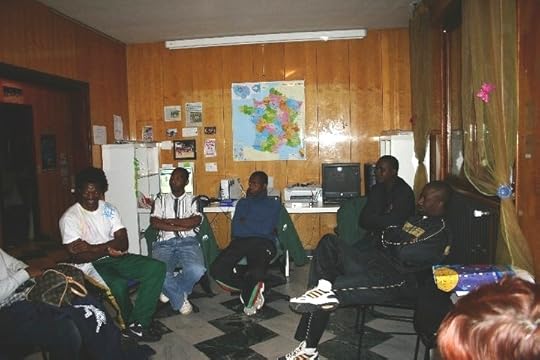 FFDD workshop in Paris for four days. This gave him an opportunity to learn a lot of skills, interact with new people, and make new friends from other countries. These friends shared their experiences about how they ran the game in their country. Many of the members were from Africa and they discussed ways of promoting the game and developing responsible leaders upon returning back to their respective countries. Innocent came back and implemented the ideas and skills learned in France and says that it helped develop the initiative a lot.
FFDD workshop in Paris for four days. This gave him an opportunity to learn a lot of skills, interact with new people, and make new friends from other countries. These friends shared their experiences about how they ran the game in their country. Many of the members were from Africa and they discussed ways of promoting the game and developing responsible leaders upon returning back to their respective countries. Innocent came back and implemented the ideas and skills learned in France and says that it helped develop the initiative a lot.
Trip to United States
Read more about the 2 members of the program's trip to the US in previous blog posts here, here, and here.
September 27, 2011
Car Wash: A business fueled with girl power
By Kibera World Wide member Florence Nthamba
You have to agree with me that it is not every day that you can easily spot girls in your neighborhood with rolled up sleeves, washing a car!! Well it's not usual business for the Binti Pamoja girls who have come up with a noble entrepreneurial idea to start washing cars in their neighborhood.
As I watch the girls washing one of the client's cars, I find myself with one big question, "What gave them such courage to come up with such an outrageous idea in a male dominated field?"
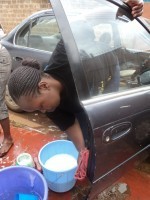 Faith, one of the key players in this new initiative, told me how they came up with their idea of washing cars. "We actually came up with the idea of opening a car wash to help empower other girls to think beyond that only men can wash cars and not us girls. Nowadays we have to hustle to get additional income and not just rely on men to give us money all the time," noted Faith.
Faith, one of the key players in this new initiative, told me how they came up with their idea of washing cars. "We actually came up with the idea of opening a car wash to help empower other girls to think beyond that only men can wash cars and not us girls. Nowadays we have to hustle to get additional income and not just rely on men to give us money all the time," noted Faith.
The girls aim to get more customers and have hung posters about their new initiative within Kibera to sell their idea. As Rose puts it, "We are trying to market our initiative within the Kibera community, let people know that we are here to offer the best, and have them try us."
One of their major challenges at the moment is availability of 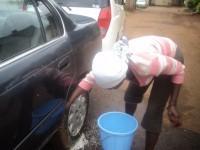 water as they are forced to purchase from water vendors within the Olympic Estate and part with some of their hard earned day's wage in paying for the water. But this does not deter them from moving on as they hope for a better today. Perhaps soon they will be able to fully sustain themselves.
water as they are forced to purchase from water vendors within the Olympic Estate and part with some of their hard earned day's wage in paying for the water. But this does not deter them from moving on as they hope for a better today. Perhaps soon they will be able to fully sustain themselves.
For the girls it is not about just washing cars, but it's about working as a team, having fun and above all, showing that girls are able to provide this service in a male dominant business.
I am motivated and happy for the girls, and I'm excited for others to read this piece and feel the same way!
September 22, 2011
Graduation Day for Binti Pamoja Girls
By Kibera World Wide member Florence Nthamba
Their laughter, teasing and excitement felt like a ray of sunshine on a rather mild day. It was the first welcoming sound that I heard when I reached the rather expansive compound. The landscape was really eye-catching and quiet different from the dirt paths of Kibera. The grass was green and trimmed and the fruit trees were beautiful as there leaves ruffled in the wind.
The Binti Pamoja (Daughters United) girls strode all over the compound in small groups finishing their work from the training they had undertaken. The purpose of the training was to develop 11-18 year old girls into confident leaders. The program provides a forum for young adolescent girls in Kibera to express themselves through drama, dancing and writing about what affects them most (i.e. rape, gender based violence, HIV&AIDS, among others). It comes as no surprise that CFK's staff of the program hope to see the girls transform into mentors who will all start and lead their own group of fifteen girls, whom they recruit from the community to join the program.
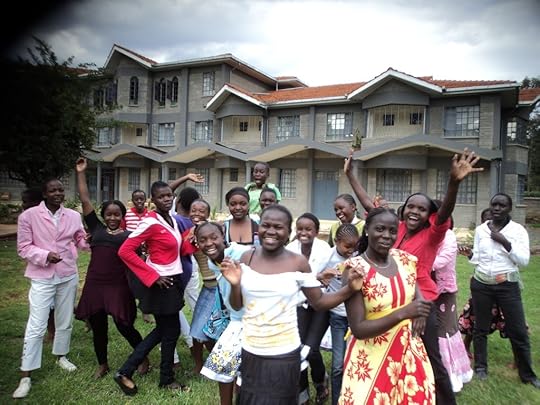 ''We've had this kind of training annually since the program believes in empowering and mentoring the girl-child. We foster them to make them leaders through an intense three year training on leadership, reproductive health, life skills and financial literacy. Our hope as a program is to make them role models for the young girls whom they are going to mentor from the community" Sarah Waithera, the Binti Pamoja Program Officer tells me.
''We've had this kind of training annually since the program believes in empowering and mentoring the girl-child. We foster them to make them leaders through an intense three year training on leadership, reproductive health, life skills and financial literacy. Our hope as a program is to make them role models for the young girls whom they are going to mentor from the community" Sarah Waithera, the Binti Pamoja Program Officer tells me.
You might find yourself asking, ''How does this work?'' A knowing smile plays on her lips, Sarah tries to fill me in, ''It is really simple. The girls this time are aged 11-18 years. We encourage them to recruit girls from the community who are younger than them for mentoring purposes. Since we have shown them how to come up with a work plan, but they have their work cut out for them. They must teach and impart the knowledge they acquired when they went through the various trainings during their time in Binti Pamoja''
I hope you do not get the impression that it was all learning and no fun. Sitting amongst the girls as they shared their experiences, was really entertaining. ''I really had a good time. Imagine sleeping in a six poster bed and waking up to a hot shower – considering the fact that I had never seen a shower before this day!'' said Jackline, one of the graduates, leaving all the girls in stitches. ''For me, I really had a good time in making new friends and getting to learn new things that I am going to teach the young girls I am to recruit in my group'' said another graduate, Diana, with excitement.
I was lucky to see some of their talents and have fun with them. Apart from the jokes they told, some of the girls like to sing like pop stars (well, not exactly) and other showed off their modeling and rapping talents.
''Yes!'' I imagined some of the girls saying as they did a mental check with themselves. Just imagine yourself in their shoes. Three years ago, coming into program as a girl with no responsibilities and now having the opportunity to pass on the knowledge they gained during their time in Binti Pamoja. I don't know about you, but if I were in their place, I would be ecstatic.
August 11, 2011
"What I loved most about the United States"
To conclude his previous blog on the East African jump rope team's trip to the U.S., Thomas Bwire interviewed the competitors upon their return-
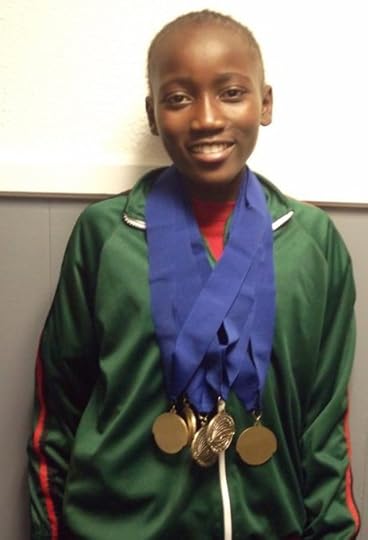
"I am so happy that I got a chance to go to the United States. I will devote my time to train fellow team members in new jump rope skills that I learned,'' says 13 year old Diana Adhiambo, a jump rope participant from Kibera. Hardly a week has passed since she returned from the United States, yet Diana is already back on the training field at Old Kibera Primary where it all started. She looks easy-going as she demonstrates some new jump rope skills to her teammates; they all stare at her as she is the center of attention.
I want to find out what she loved most while in the United States with her coach. After getting permission from Coach Innocent, Diana steps aside from her training and joins me a few meters from the field on a stone that I am sitting on.
"What were some of the most memorable moments for you in the United States?" I ask.
"People were very nice to me, I was warmly welcomed and didn't have issues with anyone, and even people not known to me easily smiled back at me, making me feel at peace," responds Diana while gazing at her friends jumping rope.
"Second, I loved seeing their houses that are well spaced with big compounds. That encourages me to work hard so that I can better the life of my siblings with a better modern house in the future, when we can move out of the Kibera slums. Last, I enjoyed the electric train ride that I saw for my first time ever in my life, it moved with such speed. I have always being seeing them on TV. At first I was scared, only to realize that it's very fast and efficient with no traffic jams like here in Kenya." She says, before politely requesting permission to rejoin her teammates.
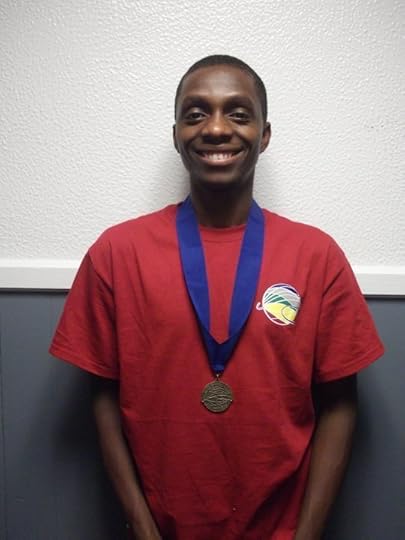 Next in line is to be interviewed is Diana's Coach Philip Innocent Nyangori, who accompanied Diana to the United States. He takes Diana's space on my stone chair.
Next in line is to be interviewed is Diana's Coach Philip Innocent Nyangori, who accompanied Diana to the United States. He takes Diana's space on my stone chair.
"Americans are the most hard-working people, they don't just idle around waiting to be spoon fed. I saw them working day and night, something that I respected a lot. No one is there to police them on the roads, yes they do have better roads with many lanes, but they strictly follow traffic laws obediently. That is real self-discipline, man." says Innocent.
"I also loved the fact that I learned new skills that will help me nurture the talent of these young stars that you see here today, simply because I was taught new skills and how to be creative by other coaches, who challenged me never to just sit back and wait, but to go out there and set my goals and achieve my targets in everything I do," he finished.
With these strong last sentiments, Innocent excuses himself and joins the rest of the team to continue with their practice that will last for 20 more minutes. Even though they've just returned, their training is already back in full swing as they get ready for their next competition.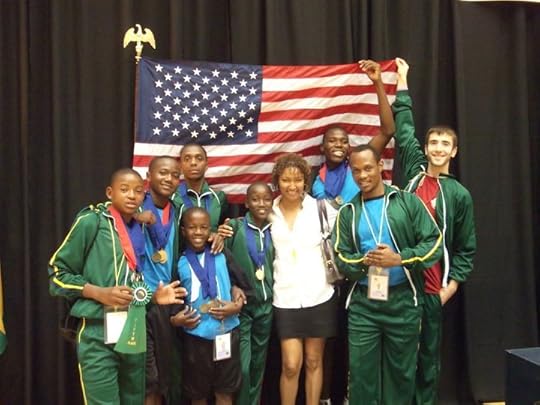
Read Thomas' previous blogs Here.
August 9, 2011
The Undeniable Reality
Chasing the Mad Lion producer Beth-Ann Kutchma received this inspiring reflection from a reader of Rye Barcott's book It Happened on the Way to War – quite a heartfelt review:
"Reading your book was a moving experience for me in so many different ways. Having been a Peace Corps volunteer in Ethiopia from 1968-70, I could empathize with your willingness to reach out and make a difference in the lives of people whose life experiences were so foreign from your own. Your initial fear and frustration about an outsider making a difference in Kibera reminded me of just how much I was shaken by the lonely feelings that gripped me in those first few months in Buno Bedelle, Ethiopia, nestled in the lush rainforests of southwestern Ethiopia. I often wondered what I was doing there in the first place. I knew that, for some reason, I was meant to be there, but I spent many restless nights trying to figure out just how I could make a difference in the lives of the children that I was teaching…in the lives of the people who would come to the clinic where I would occasionally work.
Most importantly, I was personally touched by the manner in which you managed to forge partnerships with heroes like Tabitha and Salim and, in the process, enable these community leaders to empower themselves to take ownership for the process of community building that both you and they understood was ultimately their responsibility. At the same time, it was clear that Salim and Tabitha were far more than partners in community collaboration and participatory development. Clearly, they became family and, when Tabitha whispered those words…"grass, flower and wind" to you right before she passed away, it was an undeniable reality that you felt as if you had lost a member of your family. Indeed, when she fell asleep and you made your way out to the courtyard with the hibiscus tree, your tears reflected the deep and abiding realization that underscored, for me, the underlying message of your story, that being that all of us are truly bound together by the common bonds of our humanity.
Rye, your story about Kibera was inspirational and exhilarating, exhausting and heartbreaking, uplifting and encouraging, and I want to thank you for reinforcing my belief in certain fundamental values, those being the significance of service and selflessness, the power of courage and commitment, the value of consistently standing up and speaking out with the courage of your considerable convictions about the issues that matter and, finally the faith and fortitude that sustain us in moments when the clouds of adversity seem to block any hint of hope that there may be sunlight beyond the horizon. Memories of my Peace Corps experiences came flooding back, as I read your book, Rye. Vivid recollections of faces, friendships and families from Ethiopia washed over me in a river of memories that was overwhelming, leaving me breathless and emotionally spent.
Salim and Tabitha reminded me of some of the village leaders in Buno Bedelle, who were willing to put their reputations and, at times, their lives on the line in order to maintain the identity and integrity of their home. But I must admit that it was your accounts of how the kids came forward to not only play soccer but to engage in the community trash clean up campaigns that resonated most deeply with me. The courage of those youth leaders was, in my mind, a direct result of your believing in Tabitha, Salim and other adults in the Kibera community. The young people of Kibera came to believe in their own ability to shape changes in their own lives and in the lives of their community because you had planted that seed, one that was cultivated by the commitment of everyone who came to believe in your cause. It reminded me of the kids that I taught in Ethiopia, young people who had hopes for a better life and were willing to do anything in order to achieve their goals and realize their dreams. After all, isn't that what this is all about, Rye? Isn't your book, at its deepest core, simply about our working relentlessly and committing ourselves tirelessly to the cause of social justice in the world?
I believe that those who are fortunate enough to read your book will understand the undeniable reality that it is incumbent upon all of us to be genuinely committed to shaping genuinely positive changes in the lives of other people and, in the process, impacting our world in a significant and meaningful manner.
Thanks for a wonderful book. I will be recommending it to my students, my teaching colleagues and my friends."
–Peter McVeigh, Teacher of History
Germantown Academy, Fort Washington, PA
July 26, 2011
Off To The United States For A Mission – part 2
-A continuation of Thomas Bwire's experience with the One World, One Rope jump rope team from East Africa. Read part one here.
Last week I gave you a first look into the journey to the United States that started from humble beginnings with Innocent and Diana from Carolina for Kibera along with their counterparts from Tanzania.
At the conclusion of my last post I was having a chat with 13 year old jump-roper Diana. After our conversation, Diana left me with this reflection of the opportunity that she had been presented with- "My teachers allowed me to go the U.S. and I know I will miss school. I will work hard and still try to create time to read while in the U.S. so that I can do better when I come back to Kenya. I will miss my friends and my mother who is not here to come with me to the airport."
It was shortly after this that Michael came back with photocopies of the team's E-tickets and off we drove to Jomo Kenyatta International Airport. Since we were going against the flow of traffic, the way was clear and we were able to avoid any heavy traffic.
Realizing that this was now my chance to interview Michael, I quickly pulled out my audio recorder and asked my question- "Michael, can you give me some insight into how this trip materialized?"
"My first visit to Africa was in January 2009." He responded, "I travelled to Tanzania for about two weeks, where I met Benedict from Mkombozi Center in Moshi. Later, I spent two days in Kenya where I met Innocent from Carolina for Kibera, who was dedicated to his work in jump rope training. Innocent coached six days a week. I also met Diana – what I loved about her was the fact that she had become one of the most talented girls in the jump rope program and she worked very well with other team members,"
Before I knew it, we had arrived at a police checkpoint at the entrance of the airport. A security check was conducted on our vehicle before we were allowed to pass through. Once inside the international check-in point in terminal two, I helped unload the luggage before taking out my camera to capture a few pre-departure photos.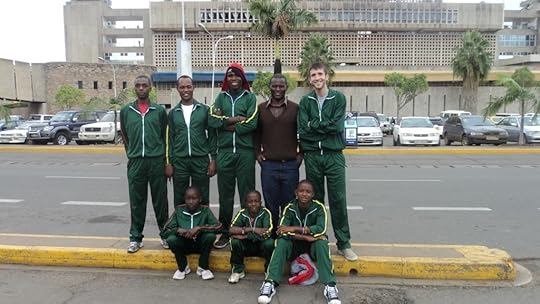
Once I had finished taking pictures, we all embraced each other and bid each other farewell and safe travels. Now alone, I turned around to return to Kibera.
Kenya and Tanzania will be representing East Africa this time around. Two founders of the World Jump Rope Program are sponsoring the team's trip to the United States this year. Some of the other countries that are sending participants to the competition are the United States, Canada, Hungary, Belgium, Germany, France, Denmark, Brazil, and India.
Participants in the competition and activities in Washington D.C. range between the ages of 13 and 18 years old. While in the United States, the participants' itinerary will include- taking part in the three day, world jump rope competition, attending a jump rope camp, and visiting Ohio- the home of One World, One Rope founder, Michael Fry. In Ohio, the participants will spend time doing performances, presentations, and workshops, and will also teach jump roping techniques to people there. Lastly, they will travel to Seattle, Washington for a four day jump rope and gymnastic workshop. On July 23rd, they will fly back home from Seattle.
In the coming weeks, look for Thomas' interview of the team following their trip to the U.S.
CFK vs. CDC thriller soccer match
CFK Administrative Assistant Jeffrey Okoro writes about the infamous soccer match between CDC and CFK staff in June:
"A good game" an utterance made at the end of a match, but was is to be? 2 Hours before the start of the game, George and I were pushing the truck allover Nakumatt Prestige (a local shopping center) and causing a minor traffic jam in the Mall after it broke down, an indication that things were going to be interesting . This was not good by all account since we were both to play as attackers on the CFK team.
Back at the office Cantar, Sports Program Officer, was busy rallying the troops to take on the CDC team. This match was lauded as the mother of all battles and we were certainly taking no prisoners with nothing short of victory on our minds. Ok it was not war, but the mood certainly painted it so. The soccer match offered one those rare spectacles where CFK and CDC staff met outside the board rooms and outside to the confines of the work perimetre. This was a rare occasion since on a normal day we would only communicate over the mail, phone or staff meetings. On the other side Mark, Tabitha Clinic Manager, was equally trying to build tempo on the CDC team, which for some reason appeared excited with Beatrice, the Deputy Branch Chief of the IEIP Program leading the cheering squad. There was a bit of a tussle over which team Hillary and Owino should play for since no one could establish where their allegiance lied.
Kick off was at 3:00 pm, and the scorching sun warmed up the mood in Old Kibera Primary soccer pitch with the crowd being nothing less than electrifying. Cheering squad from both teams had already established their presence in the field by making all sorts of noise. Soon the whistle was blow and both teams engaged in the game of cat and mouse with the ball.
George Kogolla, CFK Executive Director, was attacking on the left flank while I was on the right side. Cantar, Kennedy, Oyamo and Arafat held the middle field position while we had two ladies on our defense. Within the first five minutes of the match my ankle was twisted and I was seriously bruised on the leg, this was getting ugly (I was not faking it, just saying). Midway through the second half the heat was taking its toll starting with a couple of teammates with chubby little tummys dropping out one at a time. This was a trying moment as new players came in and the beer bellies dropped out and we didn't know whether we were gaining or losing good players.
Among the substitutes who got in was Kevin Diao. Kevin is one of the UNC summer fellows and his inclusion to the team drew a LOT of attention!!!. Kevin is an "asian mzungu" something that drew a lot of intrigue and curiosity. I consider Kibera to be a melting pot of culture because of the different ethnic groups it has and the "mzungus" that pour in during the summer, but this was a shocker for me because literally everyone thought Kevin was a martial arts expert and a monk :-/, rude. Ok there is little bit of stereotype, but is not so much. The distraction offered a perfect opportunity for Cantar to sneak in a goal for CFK, which threw the crowd into pandemonium. Amid all the aches and pain my body felt, I leaped in joy to celebrate an inflated leather get into a netK. Our celebration had hardly settled in when Gordon from CDC scored a goal. It was a disappointing turn of events for us especially after being a goal up. Soon as the final whistle was blown, all the disappointment we had because of that goal disappeared. We took a group photo and it reminded me what a great team we both are in the community.
July 25, 2011
Celebrating 10 Years With The Community
From Thomas Bwire of Kibera World Wide:
The day started with so much energy – everyone had on a smiling face that made me think of just how each person must have been feeling. Perhaps they were reflecting on the achievements gained in the last 10 years since the birth of Carolina for Kibera.
All of the children, youth, volunteers, staff and other guests waited patiently outside Carolina for Kibera's office in Olympic Estate, preparing to kick-start the program. University of North Carolina fellows Kevin Diao, Lindsey Moore, and Duke fellow Chelsea Whittle were here as well. Our team of Kibera World Wide members is not to be forgotten, however – we were here in full force to capture the day's activities and the emotions that would come with them. Armed with flip video cameras and still cameras, we rolled up our sleeves and quickly got to work.
Today the Olympic Estate experienced new black T-shirts that carried CFK's logo on the front and the 10th Anniversary motto "10 Years of Collaborative Action" along with the CFK website on the back. Wearing these shirts, no one could mistake who we were.
Shortly after 10:30am the band also rolled up their sleeves and led the procession of eager guests towards the final destination – DC grounds. The blaring band music gave everyone energy to walk and many could be seen dancing to the tunes of their favorite songs. The procession walked through the Olympic shopping center, then Karanja, and finally Makina before reaching the DC ground.
Along the way some volunteers took it upon themselves to control traffic to ensure everyone's safety. A group of young girls, leading the procession, held a white banner that read in bold, confident letters "10 Years of Collaborative Action." Kenyan Director George Kogolla and U.S. Director Leann Bankoski were both seen enjoying themselves inside the procession with other CFK team members. 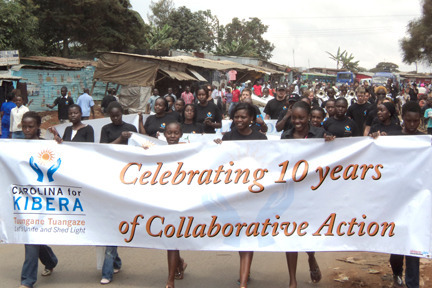 One unique feature that caught my attention as I walked through the procession was some of the sexual reproductive health team who decided to wear condoms as earrings and necklaces. "This is so creative," I mentioned to one of my male neighbors who I was walking alongside. "Oh yes!" He responded, smiling, adding that we should all carry the message of safe sex and use protection that is highly advisable for HIV/AIDS prevention.
One unique feature that caught my attention as I walked through the procession was some of the sexual reproductive health team who decided to wear condoms as earrings and necklaces. "This is so creative," I mentioned to one of my male neighbors who I was walking alongside. "Oh yes!" He responded, smiling, adding that we should all carry the message of safe sex and use protection that is highly advisable for HIV/AIDS prevention. 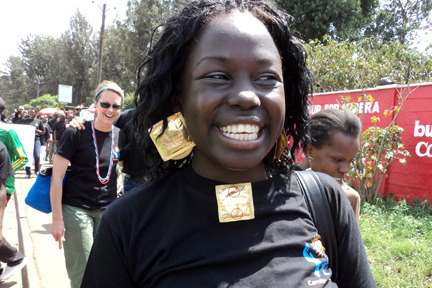
Once at the DC grounds venue, a free jig for all was warmly welcomed. The DJ famously known here played a few traditional songs, setting the pace for the day ahead. The famous Luo song Ohangla ruled the airwaves, and this one left everyone on the free-for-all dance ground mesmerized. Next, a Kamba song that I didn't completely understand played, but regardless, those dancing to this tune lifted one leg and held it like a guitar as they played imaginary strings.
Now the crowd had swelled as more Kibera locals joined the Carolina for Kibera community in celebrating this important day of the calendar. The security team took charge, making sure order was maintained and people didn't cross the boundaries erected with sisal rope. The two MCs went on stage and gave welcoming remarks to all people present. Afterwards, four girls and four boys battled in a dance-off for the number one spot, dancing according to the DJ's selection of music. The crowd served as the judges, weeding off the contestants that didn't measure up to the high standards of the crowd, until just two were left standing – one received an "indestructible" soccer ball and the other a T-shirt.
Next, volunteers from different programs performed a play in real time of the birth of Carolina for Kibera, how Rye Barcott came to Kibera 10 years ago, and about his experience with the late Mama Tabitha, who left fond memories of her passionate heart and the passion she had to improve the health care of Kibera residents. As a result of this unlikely partnership, we now have Tabitha Medical Clinic.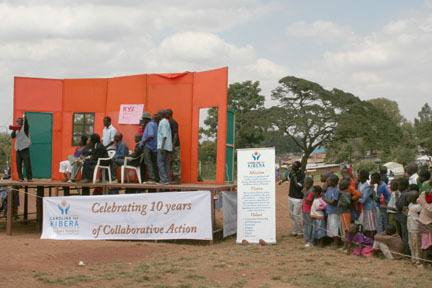 "I wish Mama Tabitha was here today to see the legacy she has built from humble beginnings to an institution that has now transformed the Kibera community," I said to myself silently as the lady playing Tabitha passed away as Rye wiped tears, not knowing what to do.
"I wish Mama Tabitha was here today to see the legacy she has built from humble beginnings to an institution that has now transformed the Kibera community," I said to myself silently as the lady playing Tabitha passed away as Rye wiped tears, not knowing what to do.
The jump rope team followed on stage and showed their best rope skipping styles that left everyone happy. Armed with a flip video camera, I recorded their whole performance. I stole some time in between performances to visit a photo exhibition stand mounted in one of the white tents, where I saw great photos of achievements in the Kibera community realized over the years, well displayed on wooden stands. 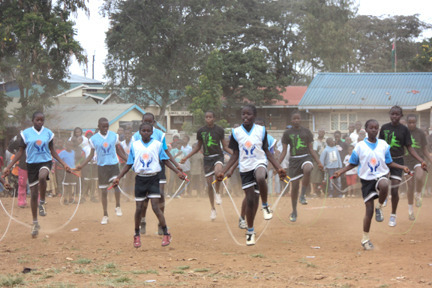
A power outage brought the event to a standstill while Mark Muasa the Clinic Manager of Tabitha Medical Clinic, was reading his speech. In part of his message, he urged the residents not to hesitate in visiting the clinic to get better health care provision.
Achievements were shared by some of the volunteers whose lives have been transformed; some from being drug addicted to peer youth educators. One such person was Moses Ojwang a true inspiration to many youths around and a role model to emulate.
Kibera World Wide team member Erick Owenga secured a one-on-one interview with Rye Barcott who could not hide his joy of seeing this day a success to many generations. "I would never have thought that 10 years ago a simple idea would lead to a community initiative that would help the Kibera community realize their dreams. What we need to focus on now is how to strengthen our activities."
"What a well spent Sunday," I said to myself.
Rye Barcott's Blog
- Rye Barcott's profile
- 7 followers




